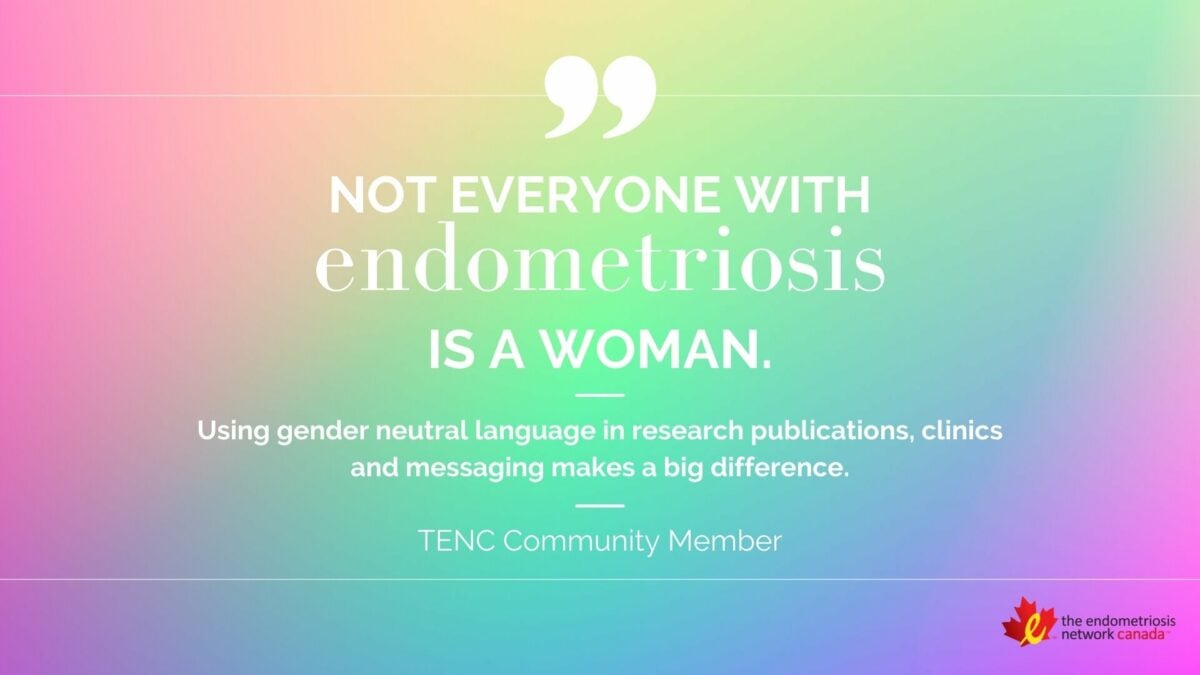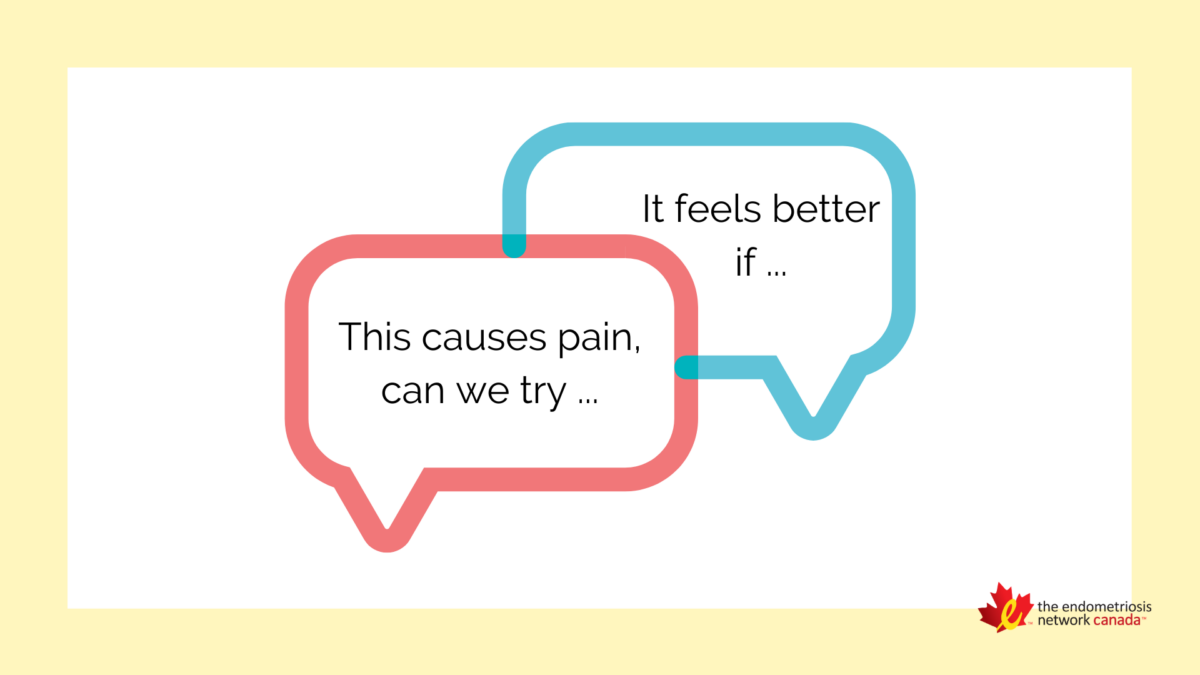
Warning: Source links contain gendered language. Discussions of pain with sex and intimacy.
Communication is essential when navigating endometriosis. It is key to helping you and others understand what you’re going through, so that you can make informed decisions about your health.
We compiled the essential tips and techniques from previously published articles on The Endometriosis Network Canada’s blog and other impactful resources that can help you and others find support at school, work or in other areas in life, as well as to speak effectively with healthcare providers, loved ones and others in the endo community.
The following information is beneficial for anyone impacted by endometriosis, whether you struggle with it yourself or if you support someone who does. We hope these tips have a lasting impact on how you navigate the world of endometriosis.

Talk to your school or work
Universities, colleges, and workplaces want to support their students and employees.
Organizing accommodations at these establishments can be helpful for everyone. Reaching out to university services or speaking to your boss can relieve a lot of anxiety and be an effective way for a person to cope with their physical and mental health.
Make your voice heard to fight for change
Advocating for endometriosis can help in many ways.
Even though constantly trying to advocate for yourself and others can be a frustrating and exhausting process, if you have the spoons to do it, it can lead to fundamental change for future endometriosis care.
Making your voice heard when speaking with Parliament members can be an effective way to do so.
Members of Parliament are elected to help the people they represent and play an important role in setting government priorities. In other words, they have the power to help make a national action plan for endometriosis happen.
Speak up for marginalized groups
When communicating about endometriosis, it is vital to speak up for people from disinvested, as well as historically and intentionally excluded, communities who face additional barriers to accessing healthcare, support and resources.
These communities include but are not limited to:
- Black, Indigenous, Asian, Filipino, Arab, Hispanic, Latine, Latinx, multi-racial, and other non-white populations
- 2SLGBTQIA+ communities
- Rural communities
- Isolated communities
- Newcomer communities
According to Denise Campbell, The Endometriosis Network Canada’s Board Director, Black people face barriers like “myths and misconceptions, lack of representation, and confronting the myths about systemic racism and discrimination.“
It’s essential to be aware of racial and ethnic disparities in health care; they need to be considered and discussed.

Another way to stand up for marginalized groups is by being more inclusive to those in the 2SLGBTQIA+ community. Being misgendered is the most common barrier that 2SLGBTQIA+ face within the endo community.
Respecting someone’s gender identity and sexual orientation is the minimum to create a safe space and trusting relationship, whether with medical practitioners or with loved ones.

Let’s talk about (painful) sex
According to a 2017 British study, 7.5% of cisgender women surveyed reported experiencing painful sex.
There are not many Canadian statistics on the same topic for cisgender women – and it’s relatively nonexistent for transgender, non-binary and gender-diverse folks; however, it’s estimated that the North American numbers range from 10-20%.
One thing that can help with painful sex is communication with your partner(s). Sexual partners can only know what’s working for you by letting them know.
Importantly, ‘pain with sex’ includes sex that isn’t solely from penetration. Many folks experience pain or cramping with orgasms, too.
All in all, talking about what works and what doesn’t will benefit everyone in the long run.

Find Support from Your FriEndos
Joining a Facebook support group like The Endometriosis Network Canada’s group for endometriosis patients may seem intimidating initially, but it can help you greatly throughout your endo journey. Communicating with other members in the endo community can make you feel heard, validated, and so much more.
Here are a few tried-and-true tips for navigating a support group:
- Take your time to research it and see how it works.
- The ‘Search’ feature is your friend – use it to find topics that were previously discussed.
- Meet People Where They Are At – for example, If you’re a beginner, know that people are commenting because they want you to get the best care possible.
- Remember, we all have unique challenges in our own endo journeys.
- Be kind.
For more details, read the article How to Be a Good FriEndo: Making the Most of Online Support Groups
It is all about communication. For a patient to discuss details of their health with someone who is new to them, they need to feel in a safe and supported environment, and communication is what gets us there.
Quick tips from The Endometriosis Network Canada’s three-part communication blog series
In winter of 2020, The Endometriosis Network Canada developed a three-part blog series on The Importance of Communication to support people in their journeys with endometriosis and provide the resources to effectively convey pain to others, advocate for expert care, and improve communication with oneself.
Here are 15 essential tips from the series:
- When describing your pain to your healthcare provider, be as specific as possible.
- Track your pain and other symptoms with a calendar, chart, or app.
- Become knowledgeable of medical terminology.
- Use metaphors to describe your experience.
- Remain open to sharing your experience with others as best as possible. When necessary, take time and give yourself space to heal.
- Do not dismiss your experience of “normal” by comparing it to those around you.
- Seek a second opinion and/or a referral to a specialist.
- Consult resources on patient advocacy provided by healthcare professionals themselves.
- Lean into support from loved ones.
- Gain inspiration from other empowering advocates in the endometriosis community.
- Listen to what your mind and body need “day by day, moment by moment, breath by breath.”
- Quantify acceptance as a means towards self-compassion and daily kindness.
- Embrace silence and become comfortable with resistance.
- Converse with your body through movement.
- Know that “it’s okay to not be okay.”
- For a more detailed explanation, check out the series for yourself
In summary
As you are able to take in all of this information and put it into practice, we hope these communication tips and resources will benefit your endometriosis experience by improving support and care outcomes, and having a positive impact on your daily life.
Do you have any communication tips of your own to share with the endo community?
We would love to hear them! Please fill out the form below, or email the The Endometriosis Network Canada team at info@endometriosisnetwork.ca, and let us know.
Note: The content of this post does not provide or replace medical advice. It is important to follow up with your doctor with any healthcare concerns you may have and to work with medical professionals to develop treatment plans that are right for you.
Terris Schneider (she/they) is the Blog Coordinator at The Endometriosis Network of Canada and a freelance writer based in Kelowna, BC (Sylix/Okanagan). As a Leo Sun and Scorpio Moon and Rising, she is a fiery advocate that brings her passion for social justice to her writing and work.
References
-
Painful sex (dyspareunia) in women: prevalence and associated factors in a British population probability survey.
Mitchell, KR, Geary, R, Graham, CA, Datta, J, Wellings, K, Sonnenberg, P, Field, N, D, Nunns, Bancroft, J, Jones, KG, Johnson, AM, Mercer, CH. BJOG 20 -
Dubé, DE. January 26, 2017, Sex is painful for 1 in 10 women:
Study. Global NewsGlobal news article